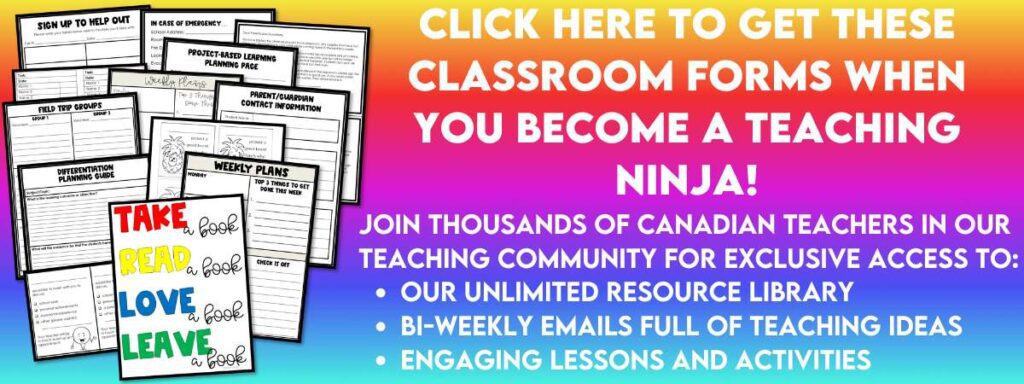
Of course, you want to be a great teacher, so congratulations on getting the chance to be a teacher! Your student teaching experience is usually the first chance you’ll get to take control of the classroom. Many factors can come into play and you might have lots of “when I have my own classroom” moments, but use this time as a chance to learn and ask questions.
We’ve been lucky enough to have amazing supervising teachers when we began our careers and it was important to us to take on student teachers when we were ready for it. Passing on our knowledge is important. This is all the advice we have given to our student teachers over the years and we hope it can help you, too.
Show Up Like It’s Your Job (Because it is)
Hours of Work
Technically this is your job. Don’t get us started about the fact you pay tuition to work for free (that’s a whole other issue). We recognize that you may need to work an actual job to pay the actual bills you may have but do your best to limit how the “real job” impacts this role. We are also aware that while you are doing your student teaching you might also be completing other courses, parenting, or caretaking for others.
Ask your cooperating teacher when the start of their day is and when it ends. Then add in the time you’ll need to plan and prepare lessons. Teaching is a full-time job in itself and student teaching will also make you feel that way.
Keep business hours as best you can. If there is a reason you need to leave early or arrive late, make sure your supervising teacher knows in advance. Don’t waste their time by having to wait for you. Be on time for meetings with staff members or any other meetings you’re invited to participate in.
You may be asked to attend evening activities like concerts, parent meetings or sports events. Plan for it. Being a member of the school community is important, and when you come back for a job later, showing interest in these activities may help.
If you are looking for a very simple set of planning pages that you can use for your student teaching, free planning pages can be found in our Resource Library, along with many other general classroom forms to help you organize your classroom, or we can send them to you when you join our ninja mailing list.
Dress Appropriately

If you can visit the school before you start, look at how other teachers dress and try to match their level of formality (or informality). You might not have a budget for new professional clothes so make sure you always look clean and not wrinkled. Your overall teaching performance will not be impacted if you wear the same pair of pants every day so long as they are clean.
Add a pair of pants or a shirt as you can afford and slowly start to build your teaching wardrobe. Choose simple pieces that you can wear for nearly any occasion or season to start. Then add one outfit per season as you can afford. Find comfortable shoes that are appropriate for being on your feet all day. Remember to think about outdoor supervision, gym class or stairs.
Be Prepared
It is far better to over-prepare and not need a lesson or activity than to run out of activities. Learning how long it takes for students to complete activities is a skill that can take years to master.
During my own student teaching, I planned a wonderful lesson about light energy that was supposed to take an hour. It took about fifteen minutes. When I asked my supervising teacher what I should do with the extra forty-five minutes we had for science, she said it was up to me. Fortunately, I already had the next day’s lesson planned, so we just kept going. That life lesson stuck.
Sometimes, we haven’t finished the planned lesson. That’s ok, too. It just means less planning tomorrow.
Being prepared goes beyond writing lesson plans. Get materials copied or uploaded for students. Set up the classroom. Watch videos you plan to show in advance to make sure everything works and that they’re appropriate. Check the technology works before you need it. Don’t leave your preparation until the last minute. This is when the power goes out or the copier is broken.
We’ve typically shared the rule of three with our students: know what you’re teaching for the next three weeks, have lessons written for the next three days, and prepare for your lesson three hours before (and you can’t count the other hours you are teaching). Our last rule means if you need it at 10 o’clock and school starts at eight, you either need to prepare the night before or at five in the morning.
And if you end up with some dead space, use one of these easy Quick Games. This Classroom Community Unit is also something you can use in your student teaching and your own classroom. Find it on Tpt ($USD) or our BN Shop ($CAN).
Be Professional

Teachers are held to a code of ethics. In fact, depending on where you are doing your student teaching you may also be held to a set of standards. Breaching the code of ethics may prevent you from getting your teaching certificate. This means you need to act with a certain level of professionalism.
You cannot share any personal information about any student outside of conversations with your supervising teacher. Keep this in mind when discussing your teaching experience with others.
Do not talk about your cooperating teacher or any staff member with others staff in a negative way. If you are having challenges with your cooperating teacher, first try to discuss them face-to-face. When that is not possible (after you have attempted to address the problem directly), talk privately with your facilitator for your university program. They will be able to help if there is a problem.
You may feel that you know better because you’ve just taken a course on the latest and greatest teaching strategies. Don’t let your excitement to try new things overshadow your ability to check yourself. While you might want to try something new and exciting, ask your cooperating teacher first before you do anything that could get you into trouble, especially if there are safety or privacy concerns.
Your social media should be kept private so that parents, staff and students will not be able to find you. Consider removing any posts that could get you into trouble. Teaching is one profession where your social media can get you fired. Never post anything school related to social media without permission.
Be a Student (behind the scenes)
Student teaching is a time to learn how to be a great teacher. You are not expected to be perfect, but you need to be open to feedback without taking it personally.
Ask Questions
You are never going to have another time in your teaching career when a veteran teacher is available to answer questions as they happen. Unfortunately, once you become a teacher, there won’t be a coach at your side who can help as you go.
Keep questions specific. Instead of, “how do I do classroom management?” Ask, “How can I prevent students from talking while I’m giving instructions?”
Make a list of questions, but try to save them for a meeting when you can get into the discussions around them. Some questions will answer themselves as you go, so look through your list regularly to either cross them off your list or refine them.
Take Notes

You will be learning so much so fast. Keep a journal or notepad handy and try to write down things that resonate with you as you watch your supervising teacher teach. (Avoid using your phone for this as it can look like you aren’t paying attention. It can also go against school policy by having phones in class.) How do they handle classroom management? What works with that one kid that keeps trying to attract attention? What does the educational assistant do (or not do)?
Reflect on your experiences. Take a few minutes when you get a chance to think about what worked in the lesson, or what didn’t. Write directly on your lesson plan when possible so you can refine future plans. Don’t forget to write down the things that went well during the day. Those little smiles are the things that will keep you going when you’re doubting yourself.
If you’re looking for a bunch of simple journaling pages, we created these for one of our student teachers. There are some habit trackers and gratitude pages, too. They can be found in our Resource Library. Or, we can send them to your inbox when you sign up for our email list.
Thank Your Cooperating Teacher
Your supervising teacher is the one who is 100% responsible for the students in the classroom. You might feel that you are doing all the work, but they are taking time to help you become a great teacher. They have to write assessments for your teaching, meet with you, give you feedback, read your lesson plans and meet with university facilitators while they are still responsible for all their regular teaching duties.
Being a supervising teacher is a volunteer position, even if your university pays them a small stipend for their time. The average stipend pays about 50 cents an hour when you take into account everything they do. One day when you decide to become a supervising teacher, you’ll see. If you are a cooperating teacher, you might enjoy our post 7 Ways to Be a Great Mentor Teacher.
You do not need to buy gifts, but a simple card and words of thank you go a long way. Many student teachers keep in touch for years.
Be a Teacher
Participate
Some student teachers sit back and become scenery when their supervising teacher is teaching. Students will see this as a reason not to take you seriously. Check with your teacher and ask if it’s ok for you to move around the room while they’re teaching (this depends on the activity). Ask students questions about the content or activity, help them out, remind them to listen or stay on task or help to hand out materials. This helps students see you as a teacher.
Build Rapport

This is a trick I have taught all my student teachers. Before you teach a single lesson formally, do an activity that will help students see you in the role of a teacher. This means an activity where you will give instructions and give students some sort of simple feedback. It could be an introduction so they learn a little about you and then they tell you something about themselves. Bring a picture of a pet or a favourite location and then ask them to draw a picture of the same for you.
If you need some simple activities check out our post 15 Free Activities for the First Month of School. Even though it refers to the first month of school, they are all getting to know you activities so they really work anytime you are entering a new group of students.
Learn Names
Learn their names. Nothing will make kids listen to you faster than when you call them by name. Say hello and good morning using their names. Say goodbye when you dismiss them with their name. It shows you care. And continue this when you become a teacher.
Be Honest
You may decide that teaching is not for you. That’s ok. It’s a hard job and it is definitely not for everyone. You may decide you love teaching but there are so many other things to consider. That’s ok. It’s true. There is a lot more to teaching than actually teaching. You may decide that you are finally where you have wanted to be all along. That’s amazing! You’re going to do a wonderful (but difficult) job.
Teaching is a very rewarding job. But truthfully, it is a job. You’ll be told that it is a calling or that you were born a teacher. And while those things are somewhat true, they are often used to guilt teachers into working for free.
Your student teaching is going to be demanding, but this is how teaching will always be (unless you’re working two jobs to get through school-you’ll be able to quit those once you get a teaching job). You will become more efficient, but there is always more to do.
That is why it is important to think about how you are going to take care of yourself. Teaching will burn you out, especially if you give your whole self to teaching. Be sure to make time for non-teaching activities. They don’t have to be whole days off. Go for a walk. Work out. Eat properly. See your friends and family. Carve out a little time every day to reset. If you don’t learn to do this while you’re learning to be a teacher, it will be even more difficult when you are in charge of your classroom.








